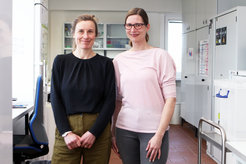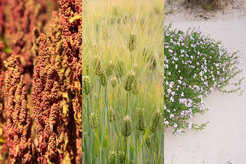New DFG research program at Kiel University on plant adaptations to global change
The German Science Foundation (DFG) funds a new Research Unit "PlantsCoChallenge" at Kiel University to investigate plant adaptation mechanisms to biotic and abiotic stress
The successful strategic orientation of plant research in Kiel was again confirmed yesterday as the German Research Foundation’s (DFG) announced that it is funding the new Research Unit (RU) 5640 "PlantsCoChallenge" at Kiel University for four years with more than four million euro.

The consortium of scientists aims to investigate the consequences of climate change and environmental stress on plant health including both crop species and wild plant species. As part of the RU 5640, the interdiplinary team of scientists will specifically investigate the physiological and evolutionary adaptations of plants to different stress factors such as drought, rising temperatures and increasing pathogen pressure in aquatic and terrestrial ecosystems. In particular, they are looking at the central role of the microbiome, i.e. the microorganisms that live in and on plants, in the development of plant stress defence mechanisms. A unique feature of the research program is that it will study plant stress biology in both aquatic and terrestrial plant systems.
The interdisciplinary project emerged from the Kiel Plant Center (KPC), the network of plant researchers at Kiel University. The RU 5640, led by Eva Stukenbrock, Professor of Environmental Genomics at Kiel University and the Max Planck Institute for Evolutionary Biology in Plön, involves around twelve scientists from the fields of genetics, ecosystem research, phytopathology, plant physiology and plant breeding, among others. The project also includes cooperation partners at the GEOMAR Helmholtz Centre for Ocean Research Kiel, the Universities of Münster and Tübingen and the Leibniz Institute of Freshwater Ecology and Inland Fisheries (IGB) in Berlin.
Kiel University’s Vice President for Research Professor Eckhard Quandt congratulates the members of the new consortium: "With the establishment of the ‘PlantsCoChallenge’ Research Unit at Kiel University, the DFG highlights the outstanding quality of our plant research and the excellent nationwide networking of the scientists involved. In doing so, they are making a particular contribution to strengthening Schleswig-Holstein as a hotspot of research in this increasingly important field of science. Congratulations to everyone involved!"
Preparing for radically altered plant growth conditions due to global change

Today's rapid environmental changes are exposing plant populations to a wide range of stress factors. So far stress responses have been studied individually, for example responses to water defiency or high temperatures. Few studies have aimed to understand how one stress factor, like water deficiency, change the susceptibility to other stress factors, as pathogen attack. Moreover little is known about the impact of environmental stress on the plant microbiome.
"We assume that the increasing stress caused by global change will alter the spectrum of biotic interactions in plants. The details of the genetic and evolutionary processes involved in stress adaptation are still largely unknown. Closing these knowledge gaps in the future is a specific goal of our new project," emphasises project leader Stukenbrock.
In five thematic sub-projects, the research group is creating a novel integrative framework for investigating the stress biology of plants by modelling various wild and cultivated plant species with different ecological origins, including barley, sea weeds and quinoa, for example. "With our findings on the diversity of plant adaptations to environmental stress, we hope not only to expand our scientific knowledge, but also to create a conceptual basis that might be used to toughen economically important crops to changing environmental conditions in the future," summarises Jennifer Selinski, RU 5640 member and Professor of Plant Cell Biology at Kiel University.

